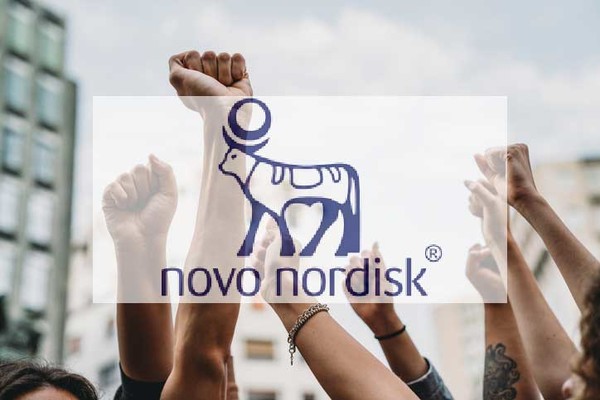The unionized workers of Novo Nordisk Korea held a protest rally in front of the company’s headquarters in southern Seoul on Thursday, after the breakdown of negotiations over wages and cuts in employee incentives.

Out of the total 118 unionists, 100 participated in the protest rally, excluding those on leaves of absence.
The union had been picketing since June 14 after the failure to conclude wage negotiations. According to union officials, the management also unilaterally changed its sales representatives’ incentive system and refused to reimburse fuel costs for managers.
The unionists have filed a complaint with the Ministry of Employment and Labor regarding incentive cuts and delayed reimbursement of fuel costs. "The union wants its members to feel they are receiving fair wages and working in a democratic, fair, and mutually respectful organizational," union leader Huh Nam-jin said to Korea Biomedical Review.
Huh stressed that the management and the union agreed on an average wage increase of 4.5 percent for 2022 last year.
"However, the management recently changed its proposal and proposed a 1.5 percent increase instead," Huh said. "The National Labor Relations Commission (NLRC) proposed a 2.5 percent increase as a mediation plan, but we cannot accept it because the union had set the wage increase rate every year until now."
Although not documented, the union decided the minimum wage increase rate every year, and the management acknowledged it, Huh explained.
He added that as the management had damaged the trust between labor and management, the 2.5 percent adjustment set by NLRC is unacceptable.
Regarding the matter, Novo Nordisk Korea stressed that the union’s claims are misleading.
“The union agreed on an average wage increase of 4.5 percent for 2022 last year and the company agreed on an average wage increase of 4.5 with a minimum 1.5 percent plus 3 percent for adjustment,” a Novo Nordisk Korea spokesperson said. “However, the labor union proposed a minimum 3.5 percent plus 1 percent for adjustment.”
Finally, the NLRC proposed a 4.5 percent with a minimum 2.5 percent plus 2 percent for adjustment as a mediation plan, but the union did not accept the mediation claiming that it had set the minimum increase until now and that it had an oral agreement with the company, she added.
However, the spokesperson stressed that the union’s claim that it had an oral agreement with the company on the union deciding on the minimum wage percent increase rate is not true.
“The minimum wage percent increase rate is something that the company and union have mutually agreed upon until now,” the spokesperson said. “Such facts are clearly stated in the transcript of the wage negotiations talks between the management and the union and in the Novo Nordisk’s official wage agreement.”
Concerning the change in the incentive system, the union claimed that it violates the employment rules that stipulate a prohibition on lowering working conditions.
Huh emphasized that the employment rules changed unfavorably without the union's consent are null and void.
"Novo Nordisk paid incentives based on performance to employees who achieved 150 percent or more in performance compared to the previous year," Huh said. "However, the management unilaterally lowered the incentives without union consent in 2019."
Huh also noted that the management unilaterally deleted the "Prestige Club" incentive clause, which provides an incentive of 2 million won ($1,540) to a department's product that achieved more than 105 percent growth or an individual performance growth of 115 percent compared to the previous year.
According to Huh, Novo Nordisk also implemented a new incentive reduction plan for employees disciplined for violating the Fair Trade Compliance Program in 2020, which the union opposed because it would mean additional disciplinary action on top of the initial punishment.
"However, the management enforced the plan stating that it was a global guideline," Huh said. The management is adhering to the position that incentives can be changed according to the guidance of the head office and do not fall under the reduction of working conditions."
While the union tried to resolve the problem amicably, the company did not show any effort to solve the problem, Huh added.
Accordingly, Huh stressed if the company does not accept the union's demands on wages, incentives, and fuel costs, the union will further increase the level of its industrial action.
The National Pharmaceutical & Bio Labor Union (NPU), an industry-specific labor union in which 16 pharmaceutical and biotechnology unions participate, stressed that it plans to support the Novo Nordisk union actively.
Ahn Deok-hwan, Novartis Korea's labor union leader, chairs NPU, which kicked off on July 5.

